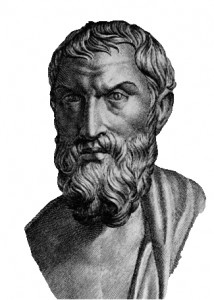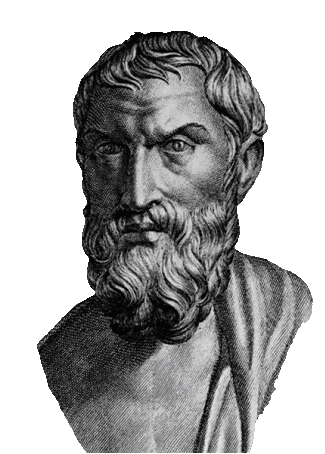Peace And Safety For Your Twentieth of August!
 Peace and Safety to the Epicureans of today, no matter where you might be! For today’s post I have selected “Aphorism 7” from Neitzsche’s “Beyond Good and Evil.”
Peace and Safety to the Epicureans of today, no matter where you might be! For today’s post I have selected “Aphorism 7” from Neitzsche’s “Beyond Good and Evil.”
7. How malicious philosophers can be! I know of nothing more stinging than the joke Epicurus took the liberty of making on Plato and the Platonists; he called them Dionysiokolakes. In its original sense, and on the face of it, the word signifies “Flatterers of Dionysius”—consequently, tyrants’ accessories and lick-spittles; besides this, however, it is as much as to say, “They are all ACTORS, there is nothing genuine about them” (for Dionysiokolax was a popular name for an actor). And the latter is really the malignant reproach that Epicurus cast upon Plato: he was annoyed by the grandiose manner, the mise en scene style of which Plato and his scholars were masters—of which Epicurus was not a master! He, the old school-teacher of Samos, who sat concealed in his little garden at Athens, and wrote three hundred books, perhaps out of rage and ambitious envy of Plato, who knows! Greece took a hundred years to find out who the garden-god Epicurus really was. Did she ever find out?”
How is it that in this passage Neitzsche can be so perceptive in seeing the Epicurean criticism of Platonism, and in other passages be so quick to adopt a Platonic regimentation of society into artificial categories of golden supermen and lesser beings?
I have now read Thus Spake Zarathrusta and The Antichrist, and I am now half-way through Beyond Good and Evil. My view at this point is that perhaps Neitzsche was not already insane when he came up with “will to power” as the key to human life. Maybe his “no good and evil” attitude is the logical conclusion of skepticism, ancient and modern. Maybe that attitude is the just retribution that religion and academic skepticism richly deserve in payment for the stupidity of their views. Regardless of that, there is a correct view of the nature of good and evil, and it is that set forth by Epicurus. Neitzsche and Neitzsche agree that there is no “God” laying down rules for men to live by, but that is not to say that “rules” do not exist from another source. Nature sets the rules, and one of the rules that Epicurus derived from Nature is aimed directly at Neitzsche’s fixation on “power.” For the truth is that “power” leads to happiness only in the most exceptional and unusual cases — so infrequently as to establish the rule:
PD 7. Some men want fame and status, thinking that they would thus make themselves secure against other men. If the life of such men really were secure, they have attained a natural good; if, however, it is insecure, they have not attained the end which by nature’s own prompting they originally sought.
And as for the fixation on “supermen,” there is NO evidence in Nature or otherwise that the point of living is the creation of a race of Neitzschean supermen. Such a vision is mystic garbage. Instead, there is no evidence to support any conclusion other than that Nature has set the limits and boundaries and goals of human life. Epicurus chose not to dream of an unreality that can never be, but to embrace the limits and boundaries of Nature, and thus he set before himself and before all the world the vision of the man who has no superior:
Who, then, is superior in your judgment to such a man? He holds a holy belief concerning the gods, and is altogether free from the fear of death. He has diligently considered the end fixed by nature, and understands how easily the limit of good things can be reached and attained, and how either the duration or the intensity of evils is but slight. Fate, which some introduce as sovereign over all things, he scorns, affirming rather that some things happen of necessity, others by chance, others through our own agency. For he sees that necessity destroys responsibility and that chance is inconstant; whereas our own actions are autonomous, and it is to them that praise and blame naturally attach. It were better, indeed, to accept the legends of the gods than to bow beneath that yoke of destiny which the natural philosophers have imposed. The one holds out some faint hope that we may escape if we honor the gods, while the necessity of the naturalists is deaf to all entreaties. Nor does he hold Chance to be a god, as the world in general does, for in the acts of a god there is no disorder; nor to be a cause, though an uncertain one, for he believes that no good or evil is dispensed by chance to men so as to make life blessed, though it supplies the starting-point of great good and great evil. He believes that the misfortune of the wise is better than the prosperity of the fool. It is better, in short, that what is well judged in action should not owe its successful issue to the aid of chance. Exercise yourself in these and related precepts day and night, both by yourself and with one who is like-minded; then never, either in waking or in dream, will you be disturbed, but will live as a god among men. For man loses all semblance of mortality by living in the midst of immortal blessings.
__________
As Seneca recorded: Sic fac omnia tamquam spectet Epicurus! So do all things as though watching were Epicurus!
And as Philodemus wrote: “I will be faithful to Epicurus, according to whom it has been my choice to live.“

